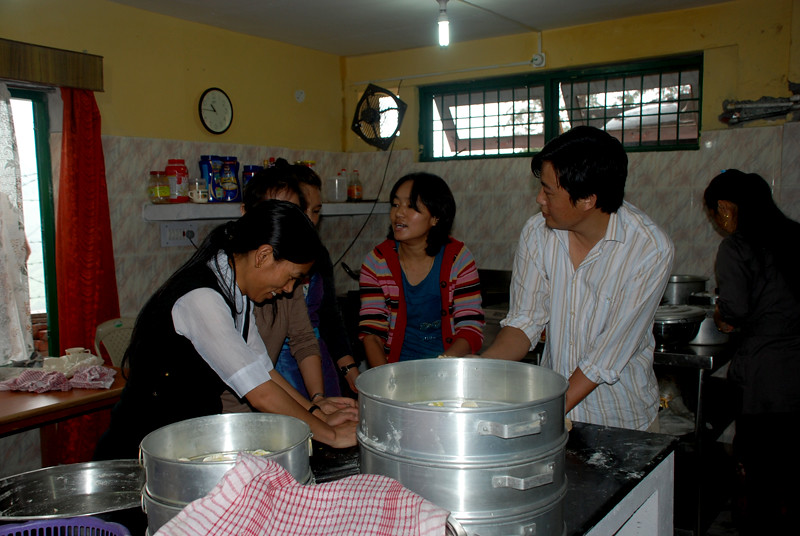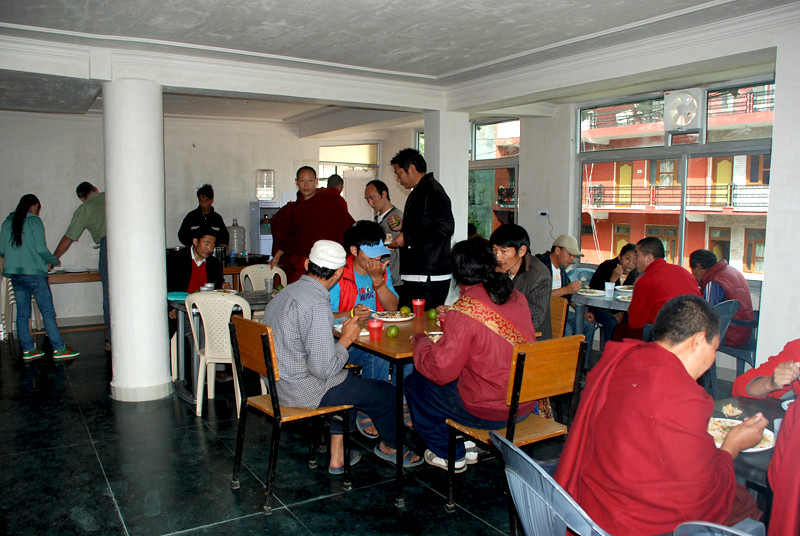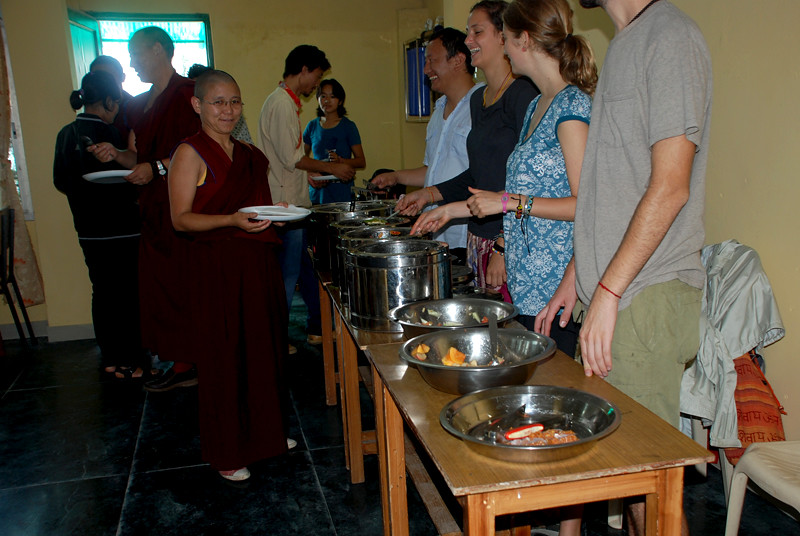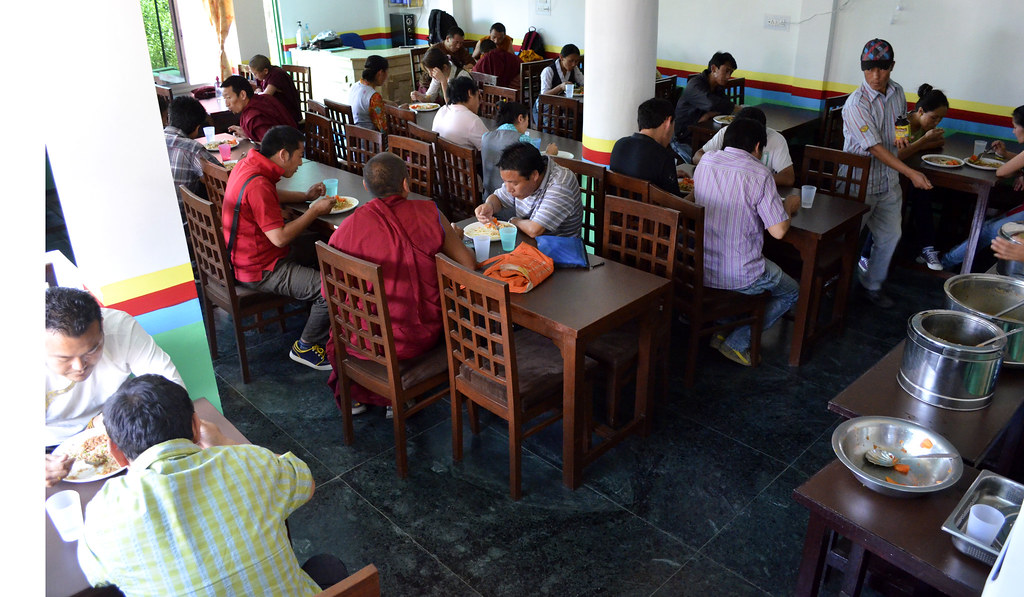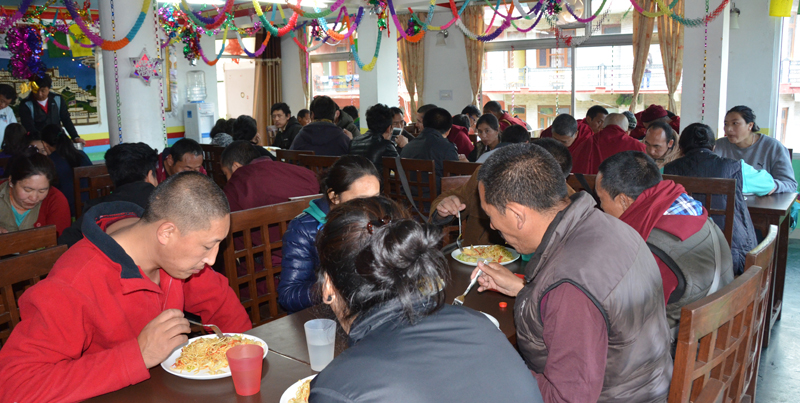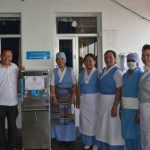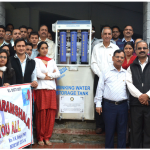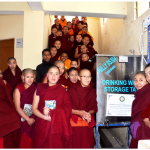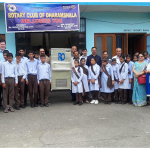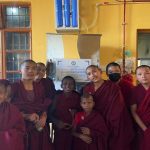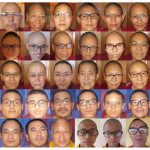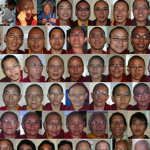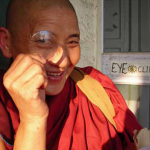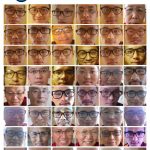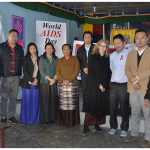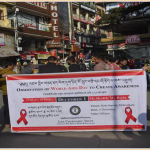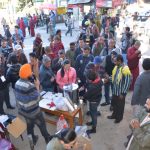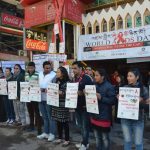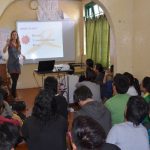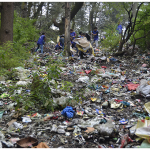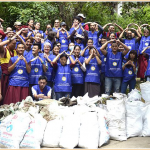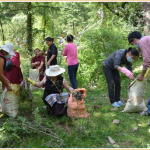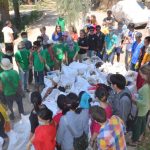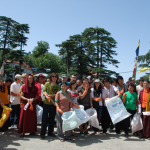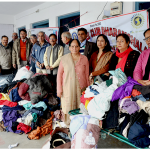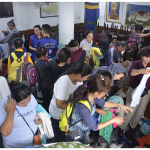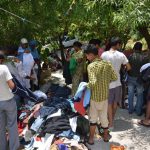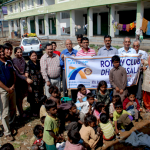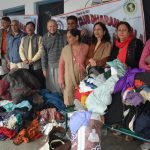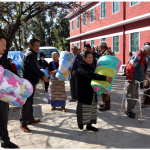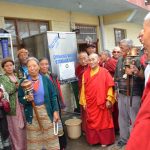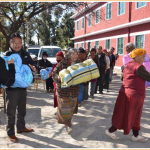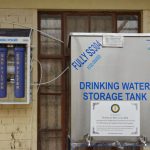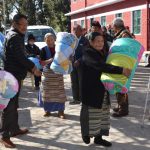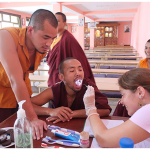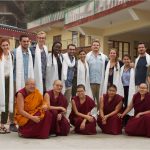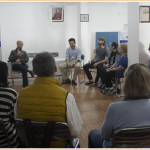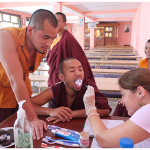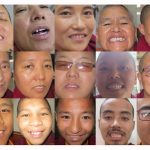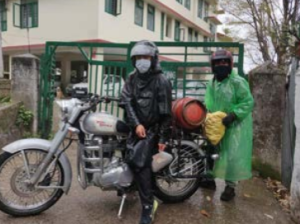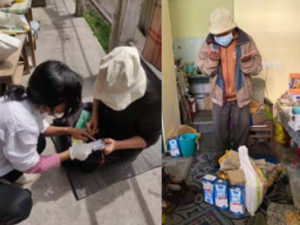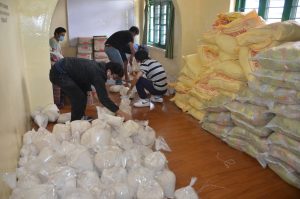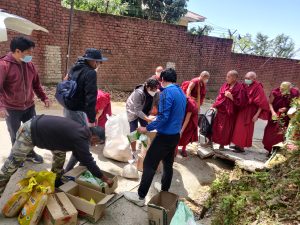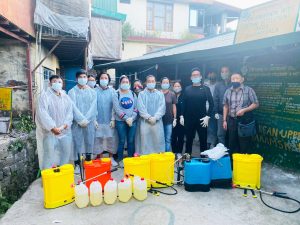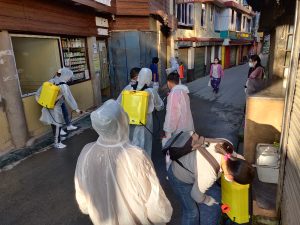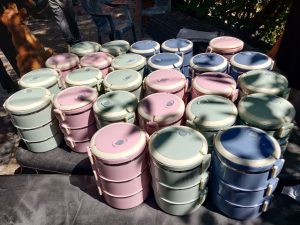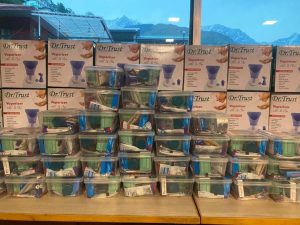Lha’s primary goal is to provide meaningful, multi-leveled social services, to help ease the transition for the Tibetan refugee community. The services are also open to the local Indian population, and people from the Himalayan regions.
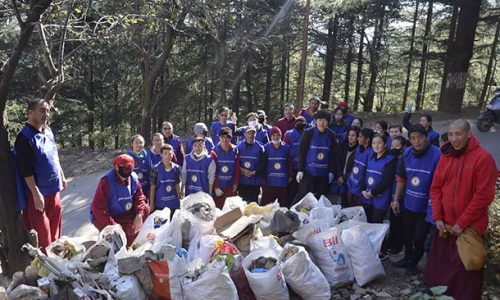
Since Lha’s founding in 1997, we have continued to be inspired by the compassion, dedication, and contributions of generous supporters, and thousands of volunteers from around the globe.
The donations from volunteers and exchange groups staying in Lha’s accommodations have allowed Lha to become more self-sufficient and sustainable. Our Language classes, Computer classes, and other daily social services are now able to continue to be provided regardless of outside funding. However, to keep up with the growing needs of the community, and to maintain the operation of our other social services and special projects such as the soup kitchen, Contact magazine, clean water, environmental initiatives, HIV/AIDs awareness, eye, dental, and health care, we continue to rely on your generous donations.
High numbers of refugees living in poverty face large scale inability to buy nutritiously dense food. This contributes to increased incidences of chronic lifestyle diseases, such as type 2 diabetes, gastritis, liver cirrhosis, heart disease, and hypertension. According to a 2009 Census, 44% of Tibetans living in Dharamsala and surrounding settlements suffer from one of these chronic lifestyle diseases.
The Lha Community Soup Kitchen aims to alleviate cases of malnutrition in Dharamsala by offering nutritious, low-cost or free meals to 40-50 Tibetan refugees daily. So far 451 needy people have benefited from the Soup kitchen project in the last eight years since its inception. In addition, Lha will empower refugees to make healthy choices about the food they eat by offering nutrition education classes at the soup kitchen. Furthermore, by starting a job training program to assist refugees in obtaining employment in the service or restaurant sector, Lha will simultaneously combat unemployment in this community.
In June 2013 a survey of 47 users of the community soup kitchen was administered in order to assess the effectiveness of the services being provided. 46 of the 47 respondents identified as being unemployed and only 6 (13%) of those surveyed receive any kind of financial support from friends or family. In a survey conducted in December 2014 by Lha volunteers on the effectiveness and use of Lha Community Soup Kitchen, nearly all of the users (96%) responded that the soup kitchen meals are beneficial to their health, and 87% said they come to the soup kitchen because of financial problems. In November 2016 one of our volunteers (Todd W. Rawls, a survey sociologist) did an assessment survey on the project to enable us to look at ways of improving the service. According to his report 98% of the beneficiaries are satisfied with the quality, nutrition and variety of the food served at the Community Kitchen.
Therefore, without the services of the soup kitchen, these people would be unable to afford healthy and nutritious food and would be forced to drink local tap water, adding to the health problems which many of them already face (51% of those surveyed identified as having existing health problems, often caused by poor quality food and water)
Note: Currently we have put a hold on this program as we change our programs and focus based on the need of the time in the community.
To help achieve its organizational objectives Lha is seeking funds to complete its clean water project which focusses on the provision of clean drinking water at identified areas of need in Dharamsala.
Whilst Dharamsala receives the second highest rainfall in India, the community suffers from the effects of both polluted drinking water and water shortages. This is due to inadequate water storage facilities and outdated drainage and septic systems which are simply overwhelmed by heavy monsoon rains.
The large number of refugees living in poverty are forced to rely on India’s inadequate public water system. According to a 2009 survey, 94% of Tibetan refugees drink tap water because few can afford to regularly buy filtered water.
Illnesses caused by contaminated drinking water include chronic gastro intestinal problems (including extreme diarrhea), with typhoid and cholera also regularly reported in the Tibetan refugee community. These illnesses can be fatal.
Contaminated water is not only being used for drinking but also for cooking, thus exacerbating pre-existing nutritional issues and adding to a low level of health within the community. Furthermore, these health issues mean that many children are unable to attend school and adults are unable to go to work, which adds to the challenges faced by the refugee community on a day to day basis.
Lha has tried to address this problem for the most vulnerable segments of the refugee population through a project of installing point-of-service water filtration systems. Lha has identified critical sites for these installations (mostly schools) and has been able to install 30 units in service since 2010. The Reverse osmosis / Ultraviolet systems used also includes a five hundred litres storage tank which provides an emergency/reserve water supply in the event of a power outage, water shortage or other problems. Through the Clean Water Project, over 17,200 beneficiaries have now access to clean drinking water.
Please find below links to our survey reports on Clean Water Project.
Clean Water Project Survey Report 2014
Clean Water Project Survey Report 2016
Lha is seeking monetary support to install more systems at schools and monasteries in both Tibetan and Indian communities. Each set of water filter systems cost 2500 USD. Any individual or organization willing to support this project can contact us at [email protected]
In September 2009, Lha took a small budget surplus and decided to implement a free eye testing program for all residents in Mcleod Ganj, both Tibetan refugees, and the local Indian population. This decision was inspired by feedback from the refugee community, many of whom had complained of eyesight problems.
Through working in conjunction with a local eye doctor, who performed preliminary testing at Lha’s office, a doctor at Delek Hospital, who performed more detailed testing, and an optometrist, who prepared prescriptions for those who required glasses, Lha was able to provide prescription glasses to a total of 145 people in need in this first event.
Since then every year, Lha carries on free eye check-ups and free eye glass distribution under Clear Vision Project. Till date, over 1200 received free eye check-ups and 300 glasses were distributed. In recent years, we have focused more on monasteries and nunneries in and around the Dharamshala region for this project.
Lha facilitates initiatives to improve community health by increasing awareness on the importance of hygiene and physical well-being. Donations of medicine are collected and distributed by Lha to public health centers, such as Delek Hospital and the Central Tibetan Administration’s Department of Health. Lha also holds workshops on HIV-AIDS and provides information on sexually transmitted diseases. Hepatitis being a common health issue in the Tibetan community, Lha also arranges awareness talks to Lha’s adult students every year.
Tibetans in exile are categorized as a high-risk group for HIV infection due to high mobility and lack of awareness of the disease. According to the Central Tibetan Administration’s (CTA) Demographic Survey of Tibetans in Exile 2009, almost 15% of the total working population engages in sweater selling activities (seasonal street vendors)—most of whom travel to urban areas alone and are separated from their families for several months out of the year.
Although no formal study has been conducted to determine the risk factors amongst Tibetan male refugees, it is highly speculated that they are at risk of exposure to HIV due to engaging in unprotected sex with commercial sex workers. HIV prevalence amongst commercial sex workers in India is significantly high according to the World Health Organization. Data on the HIV/AIDS situation in Tibetan communities in exile is limited, however, according to the CTA Department of Health data of 2010, 130 cases have been reported in individuals in exile. In Tibet, as of 2009, 103 cases were suspected.
Lha Charitable Trust intends to tackle the problem and raise awareness in the community to help reduce the incidence of HIV/AIDS in Tibetan communities living in exile. This will be achieved through a multi-leveled education and awareness programme, which we will begin in the local community of Dharamshala and extend across other Tibetan settlements throughout India. To maximize the project’s impact and efficiency, we are hoping to coordinate with the structures and organisations that are already in place such as schools, drug services and other community organisations like monasteries and women’s associations.
Alongside ensuring the consistent provision of HIV/AIDS education, we want to create a peer-to-peer education programme to access those young people who are not already in contact with above mentioned organisations. Peer education is based on the reality that many people make changes not only based on what they know but on the opinions and actions of their close, trusted peers.
Every year, Lha observes World AIDS Day and organizes events to raise public awareness of AIDs-HIV treatment and prevention. Public awareness activities include talks, distributing condoms, handing out pamphlets in three languages (Tibetan, Hindi, and English), free blood tests, street plays, and processions.
Every year on June 15th, Lha organises different campaigns and awareness programs to mark the world environment day. To assist in making Dharamshala more environmentally friendly, Lha has started a monthly mass cleanup project in collaboration with the Tibetan Settlement Office of Dharamshala and other NGOs. This project is to promote environmental conservation and awareness. At this monthly event, staff, volunteers, and students come together to participate in a mass cleanup of the surrounding area. During mass cleanups, we distribute leaflets in three languages (Tibetan, English, and Hindi) to raise awareness.
In 2014, Lha conducted a survey focusing on McLeod Ganj’s environmental status. After spending ten days surveying 107 business owners and residents in and around McLeod Ganj, Lha found that the busiest tourist spots, the Main Square area and Bhagsu Road, were considered to be the most polluted. Recordings of noise levels were also high. Through that survey, locals and visitors voiced their concerns and the daily challenges posed by environmental issues. The findings have been presented to the relevant Department of the Central Tibetan Administration and local authorities.
Following the survey, Lha made these suggestions:
First Priority – Garbage Disposal: There should be public garbage bins with a separate recycling container in each shop. While the Clean Upper Dharamshala Program has been effective, workers should have better incentives, such as higher wages. Fines for littering need to be implemented. Lastly, scheduled mass cleanups and more public toilets would reduce waste considerably.
Second Priority- Motor Vehicle Emissions: Most vehicles cater to tourists; therefore, the number of tourist and private vehicles should be controlled. This would also reduce noise pollution. One suggestion was a No-Vehicle Day once a week.
Third Priority – Sewage and Drainage: There are ineffective sewage and drainage systems, which damage roads and contribute to more congestion and pollution. The suggestion was to clean and maintain them to prevent overflow and breakage.
Fourth Priority – Raising Awareness: A Community outreach program with a door to door approach is a priority. It is advised that there also be environmental education in schools and youth centers.
In 2016, the Tibetan Representative Office of Dharamshala awarded its Environmental Care award to Lha in recognition of our contribution towards the conservation of the environment. We were recognized for our methods of carrying out many environmental awareness programs, such as the local monthly cleanup and the clearing of the largest illegal dump site on Jogiwara Road.
On June 15th 2017, an essay contest was held amongst the language students at Lha on the topic of ‘Connecting People to Nature’. Twenty-five students took part in the essay competition in Tibetan and English to create awareness of environmental issues in the community. We continue to work to create awareness, by distributing pamphlets in three different languages and organizing talks on environmental issues.
Since there are so many short and long-term visitors to Dharamshala, Lha has organized collections of their unwanted old or new clothing.
Every month, we pass on these items to the Dharamshala Rotary Club, which distributes them to those in need, particularly individuals living in poverty in lower Dharamshala. Lha also gives advance notice of clothing hand-outs in McLeod Ganj, so that the items donated are sure to reach those in need.
Since 2010, we have been organizing clothing distribution events in McLeod Ganj for the general public – both Tibetans and Indians every year. We also distribute clothing and other donation items at people living in lower Dharamashala slum area. In the past we have handed the clothing collection to Red Cross Society of Kangra District to distribute and sent items of clothing to Rewalsar (Tso Pema) where they were distributed during the cold months to needy people in the Himalayan region.
Over the years, we have collected and distributed 38,047 clothing items.
On January 6th 2015, Lha Charitable Trust distributed 130 super high quality micro-fiber quilts with extra cotton covers to the residents of Jampaling Elders’ Home. Thirty other needy people in Dharamshala also received them.
This free hand-out was honored by the presence of the Central Tibetan Administration’s Home Secretary, Mr Sonam Topgyal Khorlatsang, and the Additional Secretary, Ms Tsewang Dolma and Mr Wangchen, Director of Jampaling Elders’ Home. Mr Sonam Topgyal and Mr Wangchen expressed their heartfelt appreciation and encouragememt to Lha.
In October 2015, Lha organized a two-week acupuncture treatment program at Jampaling Elders’ Home through our professional volunteers such as medical students from the US. 80 people were treated: 50 residents of Jampaling and 30 other patients from the local community. We also donated 25 Milton stainless steel thermos flasks, 125 door curtains and 175 window curtains and pocket money of 500 INR each to all the residents. In total, 130 elderly people have benefitted from our projects at Jampaling Elders’ Home.
In a new environment speaking a different language, many Tibetans endure unnecessary suffering due to confusion about western medical care and or lack of financial ability to seek services. Through our medical assistance program, many of those are now receiving the care they need. Lha Charitable Trust now works with two teams of medical students from New Orleans, Louisiana. Student groups from Tulane and Louisiana State University (LSU) Med Schools come to Dharamshala each summer to work with our Tibetan translators and do medical, dental, and eye care assessments with over 500 monks and nuns. These students are all under the supervision of medical programs director Shuchin Shukla MD. Following the assessments, those in need are referred to Tibetan Delek Hospital and other health care suppliers to receive the care they need.
In the past three summers over 77% of all those assessed were in need of medical, dental, or eye care. For all emergency needs discovered, transportation to Delek Hospital is supplied immediately. For all non-emergency needs, records are clearly documented and then our follow-up volunteers assure all those in need are transported to health care providers to receive the services they need – medical, dental, or eye care. 100% of all those services are free of charge to the monks and nuns and fully paid for with generous donations received for these Lha Charitable Trust programs.
Lha hosts many volunteers from across the world. When we have volunteers who are experienced medical practitioners, we arrange free public health care services in the community. We have now also arranged two free acupuncture sessions where 86 of the people living at Jampaling Elder’s home were treated over two-week periods.
Many of the Tibetans we serve come from remote areas of the Himalayas where dental services are not available. In India, their diets include processed sugar and other foods harmful to teeth. Lacking dental hygiene education and financial resources, many experience painful, serious dental problems.
Since the inception of this program in 2011, Lha has been committed to providing a broad range of quality dental services to those in need.
This program keeps growing as we continue to discover more Tibetan refugees in desperate need of dental care. Over 30% of the monks and nuns thus far assessed by our volunteer medical teams have needed dental care. To date, Lha has organized treatment and provided funding for 863 Tibetans to receive dental care.
Assistance to Senior Citizens
Lha initiated a program to assist senior citizens during the peak time of the COVID-19 pandemic. Lha staff and volunteers have been on the front line every day since the nationwide lockdown on March 22. Under the guidelines issued by the Indian government, elderly people above the age of 60 were strictly instructed to stay at home. Lha has been helping seniors to buy their food, medicines and necessary essentials.
While maintaining all the necessary precautions and social distancing by our staff and volunteers, we served more than 60 seniors in and around Dharamshala up to the end of May. We still continue to receive calls for help from a few senior individuals every month. This program was carried out with support from Tibetan Settlement Office.
Distribution of Food and Basic Amenities
As the nation went into lockdown, many people were left without a job, especially the daily wage earners, taking away their only source of income. Lha with help and donations from many sponsors, distributed groceries and tsampa (a Tibetan stable food) to many needy Tibetans as well as to local Indians.
In May, we distributed, free of charge, 1,250 kilograms of rice, 1,250 kilograms of wheat flour, 250 litres of cooking oil, 100 kilograms of butter, 100 kilograms of sugar and 800 kilograms of tsampa to needy people in Dharamshala.
Lha has also provided free, door to door deliveries of tsampa and other essential groceries to Tibetan hermits living in the mountains around Dharamshala. This program was made possible with donations from a few individuals and organisations. We extend our deepest gratitude to all for their support.
Monthly Town Sanitisation
Working with the Tibetan Settlement Office (TSO) Dharamshala, Lha has volunteered to sanitize the whole area of Mcleod Ganj once every month. Since May this year Lha staff have sanitized every nook and corner of Mcleod Ganj and Forsyth Ganj each month, under the TSO initiative to control the rising number of COVID-19 positive cases in Dharamshala.
Lha has supported the TSO to the best of its capability in carrying out many programs during the pandemic and is always ready to work hand in hand with TSO when it comes to serving the community in need.
Low-cost Lunch Box Service
Lha started a low cost lunch box service from May 2020 when India was entering the second phase of the pandemic lockdown. One lunch box meal is provided for under 1 USD (INR 70), with free delivery. The service was available to the general public living in and around Mcleod Ganj and aimed to provide healthy, affordable meals and make people’s life a little more convenient during this difficult time.
The lunch box service is free for those who cannot afford to pay. This initiative also provided an occupation for Lha staff who were not working on the usual Lha programs due to the lockdown.
Initiatives During COVID-19 (Second Wave 2021)
Lha continued its COVID-19 initiative services throughout this year. In collaboration with the Dharamshala Tibetan Settlement Office (TSO), Lha assisted COVID patients in the ambulances and hospitals whenever needed during the second wave. We also volunteered to help with TSO’s monthly sanitization of the town during the peak period. At the height of the second wave of COVID-19, Lha provided free COVID home isolation kit boxes to help people recovering at home. One hundred boxes of these home isolation kits were distributed through the Department of Health, Central Tibetan Administration (CTA). Each of these boxes contained a vaporiser, pulse oximeter, hand sanitizers, N95 masks, digital thermometer, Vitamin C and Paracetamol tablets. Over 60 other such boxes were distributed directly to various individuals in May and June, 2021.
Lha’s volunteer work and contribution during the pandemic was acknowledged by the CTA, through Dharamshala Tibetan Settlement Office (TSO) with a certificate of appreciation on 24th December 2021.

